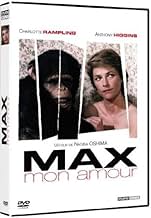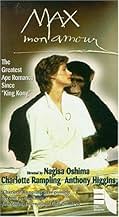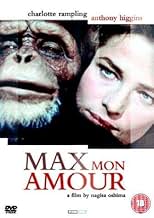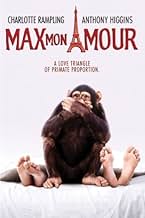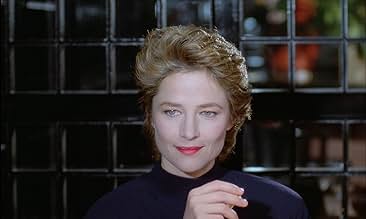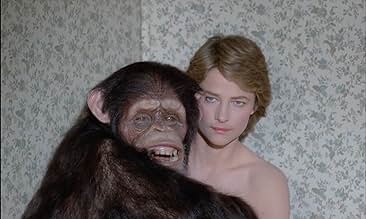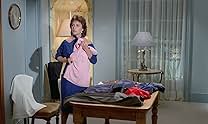VALUTAZIONE IMDb
6,0/10
1369
LA TUA VALUTAZIONE
Aggiungi una trama nella tua linguaA married French woman takes a zoo chimp named Max to be her lover.A married French woman takes a zoo chimp named Max to be her lover.A married French woman takes a zoo chimp named Max to be her lover.
- Regia
- Sceneggiatura
- Star
- Premi
- 2 candidature totali
Bernard-Pierre Donnadieu
- Archibald
- (as Bernard Pierre Donnadieu)
Bonnafet Tarbouriech
- Le vétérinaire
- (as Pierre Bonnafet)
Recensioni in evidenza
The summary on IMDb says "A French wife takes a zoo chimp named Max to be her lover" and this sounds so awful and tasteless that I just had to give it a quick look! So is it distasteful, gross and without merit or is it a comedy or film with something to say?
In this French-English language film, Peter suspects his wife Margaret might be having an affair. So, he hires a detective to follow her and the detective finds she does have a lover...a chimp! Instead of getting a divorce, the very open-minded husband invites her to bring her lover home to live with them!
The most important thing you need to know about this film is that it is NOT explicit or pornographic--at least when it comes to the chimp. Additionally, it's quite the absurdist film because everyone plays it straight and the couple are so chill about the whole bestiality angle...as are many of their friends. This is typical of many of the writer/director Nagisa Ôshima's films. The overall effect is bizarre to say the least but at least the acting is good. NOT a film for everyone...in fact, not a film for MOST people. Mostly because there isn't a lot of meaning behind all this...it's just absurd for the sake of absurdity and isn't actually that entertaining! More one for folks with serious head injuries and unnatural affection for animals! Or, for folks what watch it on a dare!
By the way, the 'chimp' in this movie is VERY obviously some guy in a crappy chimp costume. Also, if some woman was inclined to have a bestial relationship with a chimp, it wouldn't be especially satisfying. Chimp sex routinely lasts less than 5 seconds and the whole beating the woman to death because they are vicious would be a real turn off as well! Also, the detective is played by the legendary French comedy film director and actor, Pierre Étaix.
In this French-English language film, Peter suspects his wife Margaret might be having an affair. So, he hires a detective to follow her and the detective finds she does have a lover...a chimp! Instead of getting a divorce, the very open-minded husband invites her to bring her lover home to live with them!
The most important thing you need to know about this film is that it is NOT explicit or pornographic--at least when it comes to the chimp. Additionally, it's quite the absurdist film because everyone plays it straight and the couple are so chill about the whole bestiality angle...as are many of their friends. This is typical of many of the writer/director Nagisa Ôshima's films. The overall effect is bizarre to say the least but at least the acting is good. NOT a film for everyone...in fact, not a film for MOST people. Mostly because there isn't a lot of meaning behind all this...it's just absurd for the sake of absurdity and isn't actually that entertaining! More one for folks with serious head injuries and unnatural affection for animals! Or, for folks what watch it on a dare!
By the way, the 'chimp' in this movie is VERY obviously some guy in a crappy chimp costume. Also, if some woman was inclined to have a bestial relationship with a chimp, it wouldn't be especially satisfying. Chimp sex routinely lasts less than 5 seconds and the whole beating the woman to death because they are vicious would be a real turn off as well! Also, the detective is played by the legendary French comedy film director and actor, Pierre Étaix.
The premise of this film sounded just odd enough that I felt compelled to check it out at the MoMA showing last evening. I had to sit with it a day to determine exactly how I felt about it. It's definitely unusual. I found the beginning both interesting and funny, and I also enjoyed the open sequence and credits along with the score. However, the story progressed in such a way that it became clear, to me at least, that the story wasn't really developed beyond the surprise that Rampling's lover is a chimpanzee. The husbands initially accepts the situation but grows increasingly obsessed with what exactly his wife and chimp do when they're alone together, since she will not let him watch. He hires a prostitute to have sex with the monkey so he can see how it's done. There are other moments that are somewhat engaging, and the two lead performances are very good, but in the end, I found Max Mon Amour mostly unsatisfying and could have befitted from some prudent editing.
The first question one must ask upon coming across this title is "what?" The second question, surely, is "how can this possibly be sustained for the entirety of a full-length feature?" The answer is more common and less interesting, and less sensational, than you'd think from the outside looking in. Despite the premise, 'Max mon amour' isn't a sex comedy centered around bestiality. There is comedy, yes, and a facet of just such a taboo, but by and large the picture carries elements that are decidedly less remarkable. This isn't to say that the movie is inherently worse off just because it dallies with such story ideas - an open secret that a couple is keeping, and in particular the open secret of a lover or two outside their marriage; the hijinks of a highly excitable animal living within a home (think 'Beethoven' for comparison); the tension that arises between the central characters based on these ideas. Only, if you think based on a one-line synopsis that the picture is going to be something extraordinary, it really isn't. And for that matter, it's more of a comedy-drama, lightly exploring what such a scenario might earnestly look like in real life; some scenes are more farcical, others are more serious. For all that, this is quite enjoyable, even if it perhaps isn't anything one needs to go out of their way to see.
For what it's worth, this is solidly made. The screenplay whipped up between filmmaker Nagisa Oshima and co-writer Jean-Claude Carrière is curious, but refreshingly earnest in its storytelling even at its most ridiculous. Oshima's direction is commendably strong, and the cinematography of Raoul Coutard; the production design and art direction are splendid. There are tawdry notions dancing on the edge of racism (note a childish use of blackface at one point); the more ponderous beats surrounding the title character bring topics to the surface of animals' emotional intelligence, health, and welfare, but these are not specifically examined with major depth. But still, at its heart this is a feature that broaches its subject matter with total sincerity, to the point that its characters, dialogue, scene writing, and overall narrative are just as real and believable as though in most any title. This is unquestionably reflected in the acting, with performances from all - not least chief stars Charlotte Rampling and Anthony Higgins - that are as reliably sturdy as we would expect anywhere else. Throw in a bit of lighthearted silliness for good measure, and that's a wrap.
This is, to my surprise, a rather pleasant watch. It could have pushed boundaries and buttons, it could have been raunchy, it could have been total slapstick. What we get instead is less readily eye-catching, maybe, but more lastingly engaging and worthwhile. I don't think it achieves any big peak of storytelling at any point, and isn't so singular as to demand viewership. Yet whatever concerns one might have about the title based on the premise are laid to rest quite quickly, and the actual result is, gratifyingly, reasonably compelling as a detached but realistic approach is adopted. Oshima, Carrière, and all others involved are to be commended for defying assumptions, and for not taking the easy path. There's honest craftsmanship in every component part here, and I'm happy to say it's more deserving than it sounds when one first comes across it. Whether you're a fan of someone involved, extra curious, or just an avid cinephile, 'Max mon amour' isn't a must-see, but it really is a fine way to spend ninety minutes if you have the chance to watch.
For what it's worth, this is solidly made. The screenplay whipped up between filmmaker Nagisa Oshima and co-writer Jean-Claude Carrière is curious, but refreshingly earnest in its storytelling even at its most ridiculous. Oshima's direction is commendably strong, and the cinematography of Raoul Coutard; the production design and art direction are splendid. There are tawdry notions dancing on the edge of racism (note a childish use of blackface at one point); the more ponderous beats surrounding the title character bring topics to the surface of animals' emotional intelligence, health, and welfare, but these are not specifically examined with major depth. But still, at its heart this is a feature that broaches its subject matter with total sincerity, to the point that its characters, dialogue, scene writing, and overall narrative are just as real and believable as though in most any title. This is unquestionably reflected in the acting, with performances from all - not least chief stars Charlotte Rampling and Anthony Higgins - that are as reliably sturdy as we would expect anywhere else. Throw in a bit of lighthearted silliness for good measure, and that's a wrap.
This is, to my surprise, a rather pleasant watch. It could have pushed boundaries and buttons, it could have been raunchy, it could have been total slapstick. What we get instead is less readily eye-catching, maybe, but more lastingly engaging and worthwhile. I don't think it achieves any big peak of storytelling at any point, and isn't so singular as to demand viewership. Yet whatever concerns one might have about the title based on the premise are laid to rest quite quickly, and the actual result is, gratifyingly, reasonably compelling as a detached but realistic approach is adopted. Oshima, Carrière, and all others involved are to be commended for defying assumptions, and for not taking the easy path. There's honest craftsmanship in every component part here, and I'm happy to say it's more deserving than it sounds when one first comes across it. Whether you're a fan of someone involved, extra curious, or just an avid cinephile, 'Max mon amour' isn't a must-see, but it really is a fine way to spend ninety minutes if you have the chance to watch.
Interesting - an international co-production that results in a real creative fusion, not the usual mush. This movie pits deadpan surrealist aesthete Jean-Claude Carriere's script against tantrum-prone transgressor Oshima in the service of a narrative where Charlotte Rampling falls in love with a chimpanzee. In spite of the rampant in-your-face perversity, though, Carriere holds the balance of power - Oshima wouldn't have thrown in that climactic victory parade, and I doubt he could have pulled off such an informed spoof of the French bedroom comedy on his own. The bemused passivity of the husband can get a little cloying, but it's pretty remarkable how viscerally sensual the movie gets in the Rampling-chimp lovey sequences. And that goes double once you realize that it ain't no chimp - it's another Rick Baker masterpiece for ya, so that makes three auteurs.
Mainly, this film is about Charlotte Ramplings love for a monkey (a chimpanzee, to be precise), and how her family, especially her husband, deals with it. In fact, upon finding out about his wives affair, Anthony Higgins' character remains surprisingly calm; he even proposes to have the monkey live with them in their house. Maybe he wants to prevent Rampling from leaving him; or he does so since he has an affair himself; or it is his attempt to be "open minded" even in front of an utmost unusual matter. But problems soon up: Not only does the maid (young Victoria Abril!) respond negative to the new guest; the couples friends slowly find up about the hidden secret and try to "help" by drawing in psychologist, zoologists, and so forth. Then, suddenly, Max, the monkey is gone... Sounds weird? It is. All over the film, one is reminded of some of Luis Bunuels work. In one particular scene, Higgins eager to find if Rampling and Max do indeed share sexual experiences pays a prostitute to "visit" Max, about which she has no problems (other than Max!). One could read it as a commentary about, once again, the lifestyle of the Bourgeoisie and the boredom that drives them, but in fact all of the characters are likable and there's not hint of criticism on social inequalities. It's filmed in a "children film style" way, yet in its contents designed exclusively for adults. It makes for an enjoyable reception, but once you've seen it, it's not something you want to watch it all too soon, since "Max mon Amour" is basically attractive for the unpredictable unfolding of the story.
Lo sapevi?
- QuizOshima originally intended there to be a scene where Max performs cunnilingus on Margaret, but ultimately decided it would be too risque for French cinema.
- ConnessioniFeatured in The Look (2011)
I più visti
Accedi per valutare e creare un elenco di titoli salvati per ottenere consigli personalizzati
- How long is Max My Love?Powered by Alexa
Dettagli
- Data di uscita
- Paesi di origine
- Lingue
- Celebre anche come
- Max My Love
- Luoghi delle riprese
- Aziende produttrici
- Vedi altri crediti dell’azienda su IMDbPro
Contribuisci a questa pagina
Suggerisci una modifica o aggiungi i contenuti mancanti


